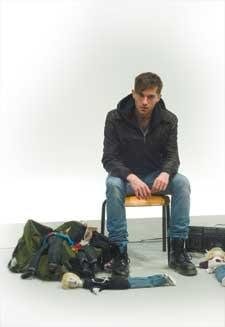Despite the fact that Jerk is a re-imagining of the events following one of the most horrific mass murders in Texas history, director Gisèle Vienne swears that she and gay writer Dennis Cooper are, in fact, very nice people.
“We are both very honest, very sweet,” Vienne says in a charmingly thick Parisian accent from a hotel room in Orléans, France.
It’s a mid-December evening before a closing-night performance of Jerk at the Centre Dramatique National d’Orléans. “When I didn’t know Dennis,” she confides, “I didn’t know which type of character he would be. But he’s absolutely a very sweet person.”
A longtime admirer of Cooper’s writing, Vienne finally met the American fiction writer — widely known for his work focused on sexuality, violence and existentialism — in 2004.
“I must say, if he would say the same, that we had like an artistic crush on each other,” she recalls. “It’s funny because he’s a homosexual guy in his mid-50s, and I’m a heterosexual girl in my 30s. I’m French and he’s American, but there are so many things [where] we’re actually really close together.”
A year after their first meeting, Cooper moved to Paris, where Vienne also lives. “It’s cool because we’re living in the same town, and it’s very good for our creative relationship.”
Cooper’s Jerk is now entering its second year of an international tour, making a local stop as one of the marquee productions at Vancouver’s Push festival this month.
The play focuses on David Brooks (played by Jonathan Capdevielle), a teenaged boy who assisted 30-year-old Dean Corll in the luring, rape and murder of at least 27 boys in Houston, Texas.
Jerk is a fictitious account of Brooks’s life in prison. The real-life killings, later dubbed the Houston Mass Murders, took place between 1970 and 1974, ending only when Corll was shot and killed by teenaged accomplice Wayne Henley.
Corll was 33 at the time of his death. His victims, all young men, were raped; some were castrated, and others were subjected to various forms of genital mutilation. Many of the victims were friends of Brooks and Henley or former employees of the candy store run by Corll and his family.
Some were so badly beaten that three were not identified for 35 years. Fifteen-year-old Randall Lee Harvey, for example, was not identified until October 2008 — the same year that Jerk began its international tour.
Although the play’s dark premise had Vienne and her collaborators doubting its success when the production started touring, she’s heartened by the largely positive audience responses to the production.
“We thought the performance would be too hard and too horrible, and we didn’t think it would be successful,” she says. “I was surprised this performance was very successful. It doesn’t please everybody, but most of the audience are very enthusiastic, in a strange way, watching this performance.”
Capdevielle’s sensitive portrayal of Brooks softens the otherwise difficult character for the audience, Vienne says. “He’s fragile and funny at the beginning, so people start to [develop] affection for this character.”
Through the course of the performance, audience members sometimes become confused about when the reality of the story ends and the fiction begins, Vienne adds. Such are the chief objectives of Vienne’s work: blur the lines between fantasy and reality.
“It’s about facing what we’re afraid of,” she says. “I try to use trauma as taboo. Sexuality and crime on teenagers are, nowadays, in the early 21st century, very, very strong taboos.”
Influenced by the work of filmmaker David Lynch, Vienne says the surreal aspects of her work help make sense of otherwise horrific events like the Houston Mass Murders.
Brooks uses puppets in Jerk to re-enact the gruesome murders. More than a story of abuse, Vienne says the play aims to question the boundaries between fact and fiction.
“When you read the newspaper and you want to read the details of a case of a serial killing, you’re more fulfilling your fantasy than looking for information,” she maintains. “I didn’t investigate so deeply in the real story [of the Houston Mass Murders], but obviously in our story, it’s a sadistic, cruel, gay sexual relation.”
Asked if she therefore considers Jerk to be a gay play, Vienne says she prefers to leave that question up to the audience.
For her, the questions of Corll’s sexuality and whether he had a relationship with his accomplices matter less than the opportunity the story offers as a vessel through which to explore the blurred lines between fact and fiction.

 Why you can trust Xtra
Why you can trust Xtra


